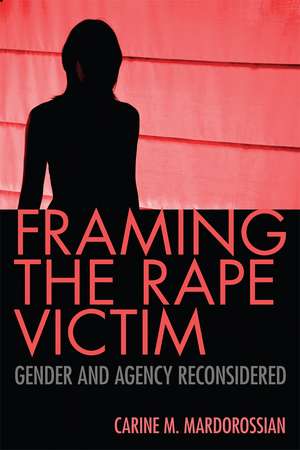Framing the Rape Victim: Gender and Agency Reconsidered
Autor Carine M. Mardorossianen Limba Engleză Paperback – 12 mai 2014
Winner of the 2016 Nonfiction Category from The Authors' Zone
In recent years, members of legal, law enforcement, media and academic circles have portrayed rape as a special kind of crime distinct from other forms of violence. In Framing the Rape Victim, Carine M. Mardorossian argues that this differential treatment of rape has exacerbated the ghettoizing of sexual violence along gendered lines and has repeatedly led to women’s being accused of triggering, if not causing, rape through immodest behavior, comportment, passivity, or weakness.
Contesting the notion that rape is the result of deviant behaviors of victims or perpetrators, Mardorossian argues that rape saturates our culture and defines masculinity’s relation to femininity, both of which are structural positions rather than biologically derived ones. Using diverse examples throughout, Mardorossian draws from Hollywood film and popular culture to contemporary women’s fiction and hospitalized birth emphasizing that the position of dominant masculinity can be occupied by men, women, or institutions, while structural femininity is a position that may define and subordinate men, minorities, and other marginalized groups just as effectively as it does women. Highlighting the legacies of the politically correct debates of the 1990s and the terrorist attacks of 9/11, the book illustrates how the framing of the term “victim” has played a fundamental role in constructing notions of agency that valorize autonomy and support exclusionary, especially masculine, models of American selfhood.
The gendering of rape, including by well-meaning, sometimes feminist, voices that claim to have victims’ best interests at heart, ultimately obscures its true role in our culture. Both a critical analysis and a call to action, Framing the Rape Victim shows that rape is not a special interest issue that pertains just to women but a pervasive one that affects our society as a whole.
In recent years, members of legal, law enforcement, media and academic circles have portrayed rape as a special kind of crime distinct from other forms of violence. In Framing the Rape Victim, Carine M. Mardorossian argues that this differential treatment of rape has exacerbated the ghettoizing of sexual violence along gendered lines and has repeatedly led to women’s being accused of triggering, if not causing, rape through immodest behavior, comportment, passivity, or weakness.
Contesting the notion that rape is the result of deviant behaviors of victims or perpetrators, Mardorossian argues that rape saturates our culture and defines masculinity’s relation to femininity, both of which are structural positions rather than biologically derived ones. Using diverse examples throughout, Mardorossian draws from Hollywood film and popular culture to contemporary women’s fiction and hospitalized birth emphasizing that the position of dominant masculinity can be occupied by men, women, or institutions, while structural femininity is a position that may define and subordinate men, minorities, and other marginalized groups just as effectively as it does women. Highlighting the legacies of the politically correct debates of the 1990s and the terrorist attacks of 9/11, the book illustrates how the framing of the term “victim” has played a fundamental role in constructing notions of agency that valorize autonomy and support exclusionary, especially masculine, models of American selfhood.
The gendering of rape, including by well-meaning, sometimes feminist, voices that claim to have victims’ best interests at heart, ultimately obscures its true role in our culture. Both a critical analysis and a call to action, Framing the Rape Victim shows that rape is not a special interest issue that pertains just to women but a pervasive one that affects our society as a whole.
| Toate formatele și edițiile | Preț | Express |
|---|---|---|
| Paperback (1) | 279.58 lei 6-8 săpt. | |
| Rutgers University Press – 12 mai 2014 | 279.58 lei 6-8 săpt. | |
| Hardback (1) | 810.42 lei 6-8 săpt. | |
| Rutgers University Press – 12 mai 2014 | 810.42 lei 6-8 săpt. |
Preț: 279.58 lei
Nou
Puncte Express: 419
Preț estimativ în valută:
53.52€ • 55.04$ • 44.40£
53.52€ • 55.04$ • 44.40£
Carte tipărită la comandă
Livrare economică 19 februarie-05 martie
Preluare comenzi: 021 569.72.76
Specificații
ISBN-13: 9780813566023
ISBN-10: 0813566029
Pagini: 178
Ilustrații: 2 photographs
Dimensiuni: 152 x 229 x 13 mm
Greutate: 0.27 kg
Ediția:None
Editura: Rutgers University Press
Colecția Rutgers University Press
ISBN-10: 0813566029
Pagini: 178
Ilustrații: 2 photographs
Dimensiuni: 152 x 229 x 13 mm
Greutate: 0.27 kg
Ediția:None
Editura: Rutgers University Press
Colecția Rutgers University Press
Notă biografică
CARINE M. MARDOROSSIAN is a professor of English at the University of Buffalo. Her first book was Reclaiming Difference: Caribbean Women Rewrite Postcolonialism.
Cuprins
Acknowledgments
Introduction
1. Framing the Victim
2. Rape and Victimology in Feminist Theory
3. "Birth Rape": Laboring Women, Coaching Men, and Natural Childbirth in the Hospital Setting
4. Prison Rape, Masculinity, and the Missed Alliances of Hollywood Cinema
5. Rape by Proxy in Contemporary Diasporic Women's Fiction
Conclusion
Notes
Works Cited
Index
Introduction
1. Framing the Victim
2. Rape and Victimology in Feminist Theory
3. "Birth Rape": Laboring Women, Coaching Men, and Natural Childbirth in the Hospital Setting
4. Prison Rape, Masculinity, and the Missed Alliances of Hollywood Cinema
5. Rape by Proxy in Contemporary Diasporic Women's Fiction
Conclusion
Notes
Works Cited
Index
Recenzii
“With a distinctive, innovative, and powerful feminist voice, Mardorossian makes a fantastic contribution to the scholarship on sexual violence that will excite much interest and fuel many debates. Framing the Rape Victim is simply brilliant.”
"Mardorossian powerfully illustrates how aversion to 'victim rhetoric' has valorized agency but ignored the ways political and cultural institutions shape experiences of choice, consent, autonomy, and vulnerability."
"A powerful critique."
Descriere
In recent years, members of legal, law enforcement, media and academic circles have portrayed rape as a special kind of crime distinct from other forms of violence. In Framing the Rape Victim, Carine M. Mardorossian argues that this differential treatment of rape has exacerbated the ghettoizing of sexual violence along gendered lines. Both a critical analysis and a call to action, Framing the Rape Victim shows that rape is not a special interest issue that pertains just to women but a pervasive one that affects our society as a whole.














